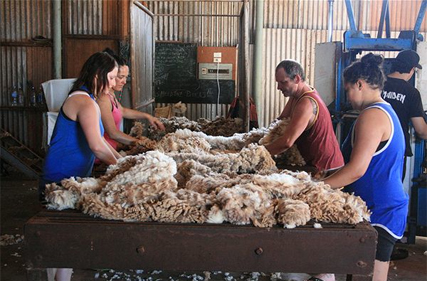 Merino Fleece in the northern region opened slightly cheaper for the average and good style fleece lines, however the selection of best style and strength FNF lots continued to trade in seller’s favour. Merino Fleece in the northern region opened slightly cheaper for the average and good style fleece lines, however the selection of best style and strength FNF lots continued to trade in seller’s favour.
Fleece lines containing 2-4% of VM remained firm on Tuesday. Wednesday’s stylish selection of 19µ and coarser fleece lot attracted more competition than the day before. Sydney’s Merino fleece closed generally like the previous week with small rises in the 19.5µ and coarser lines. Melbourne quotes were generally 10-15c cheaper, whilst Fremantle measured 5-10c cheaper. Discounts for high CVH are appearing as the midpoint break starts to increase week by week. Merino Skirtings opened the week under some reduced-price pressure, whilst the average skirtings under 6% VM were generally 5-15 cheaper, the best “broken” and lots with over 6% seemed to hold the previous week’s levels. Crossbreds are showing signs of reduced competition, a trend anticipated by the trade in recent weeks. The primary buyers of Crossbred fleece appear to be factoring in the increasing volumes arriving at brokers’ stores, along with the significant number of bales being booked directly into exporter-broker shipments without going to auction. I expect further price declines in this sector as we navigate through the peak shearing season in the southeastern regions. Merino Cardings held firm in Sydney while Melbourne and Fremantle resulted in falls in their MC of 7c and 10c respectively. Market Commentary: The widely successful release of the AWSS Australian Wool Sustainability Scheme earlier in the year at the IWTO Conference in Adeleide, was back in the limelight this week. A number of local and overseas media publications featured AWWS SustainaWOOL and ResponsiWOOL programs as AWEX step up the marketing of the exciting new Australian owned and operated Certified Integrity Scheme concept. Whilst the most commonly asked question of “how much $ return will I get from the certification?” is dependent to your wool clip specifications, this week the CIS premiums are only reported to be 3%-5% the ability to gain more market access for Australian grown and certified into the future is certainly worth looking at when the impact of the current world economic dilemma of high interest rates and low GDP reverses. We would encourage our wool producing clients to speak to their Wool Technical Officer about the benefits of joining up. ~ Marty Moses |
